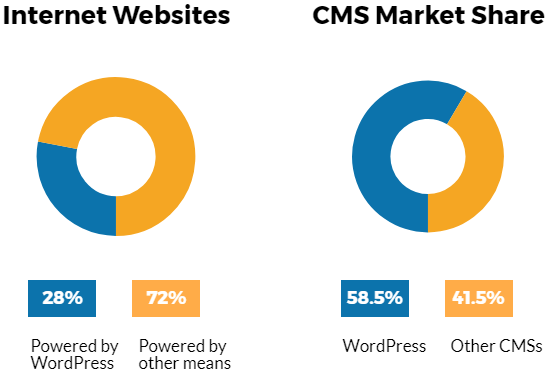
WordPress runs 28% of the internet. And from a market point of view, WordPress has a 58.5% piece of the CMS-pie. WordPress’ versatility and ease of use has made it incredibly popular.

Behind every successful WordPress website is a solid host. This aspect is often overlooked, yet it’s one of the key components of having a solid site. You need to ensure speed, security, and availability. Try to build a following around a sluggish site that goes down every other week.
Not so easy.
So what should you look for in a good host? There are a few main things you should consider. But before we get into that, let’s examine the requirements of hosting a WordPress site.
The WordPress script is actually very lightweight, and is compatible with most reputable hosting companies. This shouldn’t be much of a surprise considering its substantial market share.
What’s needed of a host is simply:
- PHP version 7 or greater
- MySQL version 5.6 or greater
Next up, you should consider your needs. It’s important to align your requirements with your host’s capabilities, so you don’t end up in a situation where you’ve spent hundreds of dollars on something that you suddenly realize you don’t need. Consider things like:
- Speed
- Bandwidth
- Price
- Support offered
- Configuration options
How these needs are tackled depend on the type of hosting offered. Hence it’s good to have a general understanding of what the different types of hosting are and what they typically mean.
Free Hosting
There’s no such thing as a free lunch. Or free web hosting. The latter generally come with a catch in one form or another. This can be that you have to advertise on your page, for example. In addition to this, you can’t count on free web hosting to be nearly as reliable as paid options.
Suitable for: Those starting out with WordPress or want to build a small personal site.
Pros:
- Free
Cons:
- Unreliable
- Generally low performance
- Often comes with a catch, such as advertising
- No support
Shared Hosting
This is the cheapest (aside from free) and most popular option. Shared hosting means that you share the server resources with other pages. That includes things like memory, computational power, and server load. Many of these options advertise unlimited bandwidth, but in reality that’s simply not the case. If you start taking up too much resources with your page(s), you will likely be asked to upgrade.
Suitable for: Blogs, small businesses.
Pros:
- Affordable
- Generally easy to set up
Cons:
- Unrefined space with limited resources
- Limited control over performance
Managed WordPress Hosting
This is a relatively new concept in the hosting market. Managed hosting means that you can only host WordPress based sites, and nothing else. The benefit of this type of hosting is that it’s meant to be very much hassle-free. That is, no need to hire a PHP developer. It takes care of things like automatic backups, security, performance, updates, etc. With this, of course, comes a slightly higher price tag. Think somewhere between at least $30-99 dollars per month.
Suitable for: Blogs, small businesses to fairly large enterprises
Pros:
- Easy to set up
- Easy to manage
- Somewhat affordable
Cons:
- Often more expensive than shared options
- Often not as much performance control as more expensive options
VPS Hosting:
Virtual Private Server, or VPS, means you have your own reserved server partition with a protected memory and computational power. Here your website won’t be affected by the demand from other users on the server. Often, you’re also given root access to the server, meaning you can configure certain aspects, like memory usage, if needed. Generally this is in exchange for a fee. This gives you increased control if you need to adjust your server based on how your business transforms and grows. But along with that, you need to know what you’re doing with WordPress and with servers.
Suitable for: Medium-sized businesses and businesses poised for rapid growth.
Pros:
- High level of customization possible
Cons:
- A higher-priced option
- Often requires decent IT knowledge to maximize use of resources
Dedicated Hosting:
A dedicated server is exactly what it sounds like, you’ll be assigned a physical server that’s solely for your website. It’s kind of like VPS, but you get the actual hardware. It’s not for your everyday use.
Dedicated hosting will let you optimize performance, since you will have all the power at your disposal. But, as you might have guessed, this comes at a price. At least hundreds, if not thousands, of dollars a month.
Suitable for: Large businesses, high-traffic websites, complex and CPU-intensive apps or databases.
Pros:
- Full control and use of server’s computational power and memory
Cons:
- Pricy
- Might require (sometimes a lot) more maintenance from you
Take these as general recommendations and see what best suits you. If you’re a medium-or-above-sized business, consider moving away from shared hosting. And if you’re just planning on running a small blog, no need for dedicated hosting (unless you want to splurge).
Whether you opt for shared, dedicated or VPS you can get the discounts offers or promo code from the coupon site like CheapSSLCouponCode, here you will get coupons of all the leading hosting providers.
WordPress Development | WordPress Theme Development | PSD To WordPress

